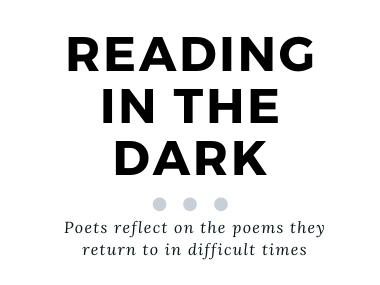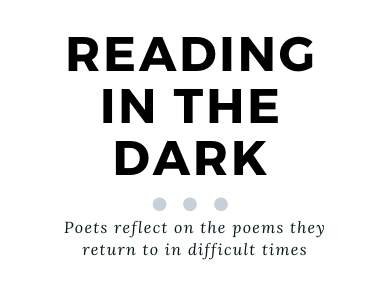Reading in the Dark
Kazim Ali on Rick Barot’s “A Poem as Long as California”

A Poem as Long as California
This is my pastoral: the used car lot
where someone read Song of Myself over the loudspeaker
all that afternoon, to customers who walked among the cars
mostly absent to what they heard,
except for the one or two who looked up
into the air, as though they recognized the reckless phrases
hovering there among the colored streamers,
their faces suddenly loose with a dreamy attention.
This is also my pastoral: once a week,
in the apartment above, the prayer group that would chant
for a sustained hour. I never saw them,
I didn’t know the words they sang, but I could feel
my breath running heavy or light
as the hour’s abstract narrative unfolded, rising and falling,
sometimes changing in abrupt turns
of speed, as though a new voice had taken the lead.
And this, too, is my pastoral: reading in my car
in the supermarket parking lot, reading the Spicer poem
where he wants to write a poem as long
as California. It was cold in the car, then it was too dark.
Why had I been so forlorn, when there was so much
just beyond, leaning into life? Even the cart
pushed against a concrete island, the forgotten melon
in its basket like a lost green sun.
And this is my pastoral: reading again and again
the paragraph in the novel by DeLillo where the family eats
the take-out fried chicken in their car,
not talking, trading the parts of the meal among themselves
in a primal choreography, a softly single consciousness,
while outside, everything stumbled apart,
the grim world pastoralizing their heavy coats,
the car’s windows, their breath and hands, the grease.
If, by pastoral, we mean a kind of peace,
this is my pastoral: walking up Grand Avenue, down 6th
Avenue, up Charing Cross Road, down Canal,
then up Valencia, all the way back to Agua Dulce Street,
the street of my childhood, terrifying with roaring trucks
and stray dogs, but whose cold sweetness
flowed night and day from the artesian well at the corner,
where the poor got their water. And this is
also my pastoral: in 1502, when Albrecht Dürer painted
the young hare, he painted into its eye
the window of his studio. The hare is the color
of a winter meadow, brown and gold, each strand of fur
like a slip of grass holding an exact amount
of the season’s voltage. And the window within the eye,
which you don’t see until you see, is white as a winter sky,
though you know it is joy that is held there.
Reprinted with the permission of the author. All rights reserved.
In response to the Coronavirus pandemic, we asked poets to write about the poems they return to in difficult times—to find solace, perspective, or even a moment of delight. Subscribe to the PSA newsletter for more Reading In The Dark responses and to keep updated with the PSA.
The pastoral—in both its classical and contemporary form—was a fiction to keep us alive through the traumas of empire. That there was an idealized countryside—emptied of both wild animals and plant growth as well as anyone who lived there before it was emptied—made empire, and later industry and capital worth the price that was paid. Isolated in our own houses we might need the pastoral more than ever or we may need it never again. It is hard to tell which when you are in the middle of a moment. In days of social distance and quarantine and global viral transmission perhaps it is easier to understand what Joyelle McSweeney argues: the idealized view of nature is a lie; the “necropastoral” (as she calls it) also must hold death and decay and all the chaotic and entropic processes of nature.
By its very name, the ambition of Rick Barot’s poem “A Poem as Long as California” is to conflate time and space (i.e. not “Large as California”) but also to traffic in an important subgenre of the American pastoral, which is the writing/inscribing of the last-to-be-reached-by-the-settler-government West Coast (before expanding into the Pacific and out into space—stories for another time).
In any case, Barot’s pastoral is unexpected. It includes things like used car lots and the prayer group chanting in the apartment above his. Jack Spicer (and his own desire to “write a poem as long as California”) appears, as does an actual wander through Barot’s urban landscape of his hometown. If, as Stein said, the United States was the oldest country on earth because it had been in the 20th century the longest, then California is the oldest state in the US because it has been in the 21st century the longest.
And then a beautiful turn in the closing gesture of the poem: across the world and centuries back in time, a dizzying move that takes California global but also offers the reader a window—yes—into a moment where the pastoral (the distant, the pristine, the perfect) undoes itself in the eye of the artist, who also undoes his own role, relinquishing the role of maker and embracing existence as a person present in a reality not at all of his own making.
Whether the poet “makes” solely by observing is a question more practically for physicists than literary theorists, though the latter have had their whack at it. What really happens in Barot’s world (neither distant, nor pristine, nor perfect) is that he is in it, inside it, living it. If a used car lot can be a world, a house can be a world, an eye can be a world, an I can be a world.
—Kazim Ali
Kazim Ali books encompass multiple genres, including the volumes of poetry Inquisition, Sky Ward, The Far Mosque, and the cross-genre texts Bright Felon and Wind Instrument. He is currently a Professor of Literature at the University of California, San Diego. His newest books are a volume of three long poems entitled The Voice of Sheila Chandra and a memoir of his Canadian childhood, Northern Light.

